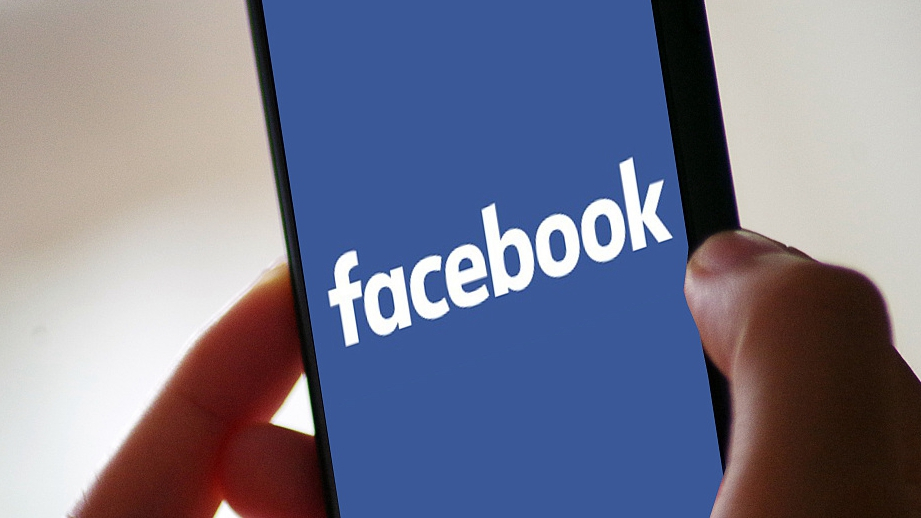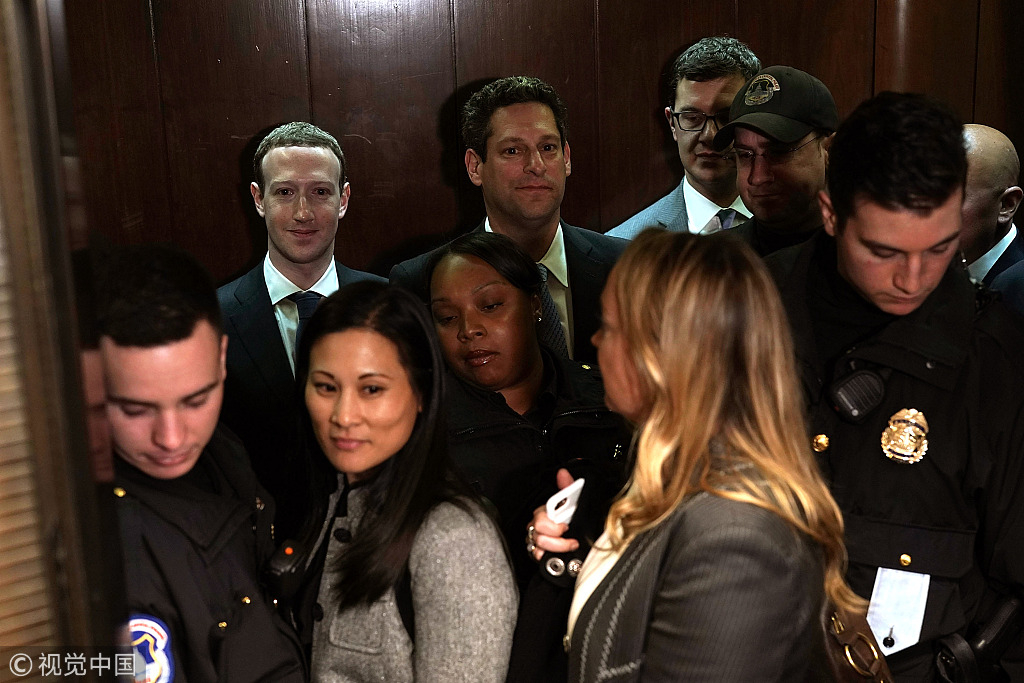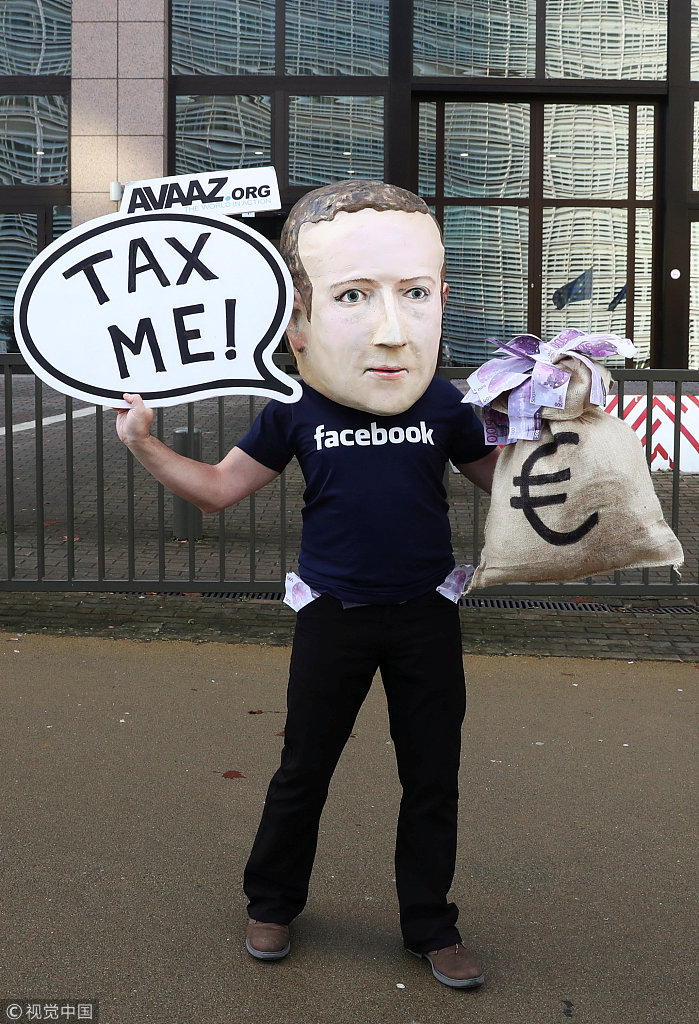
Opinion
12:54, 03-Apr-2019
Is Facebook serious in its call for more active government regulatory role?
David Lee

Editor's note: David Lee is a consultant and author based in Beijing who works on cross-cutting themes of energy, health, international politics and international development. The article reflects the author's opinion, and not necessarily the views of CGTN.
Last week, Facebook's Mark Zuckerberg called for a more active government regulatory role in managing the Internet. More specifically, Zuckerberg highlighted four areas for regulation: harmful content, election integrity, privacy, and data portability.
Facebook has been in the center of controversy since the 2016 U.S. presidential election. Mired in a number of scandals concerning user privacy breach, the company is facing potential hefty fines in many countries across the world.

Facebook CEO Mark Zuckerberg, upper left, leaves with aides after a meeting with U.S. Sen. Chuck Grassley (R-IA), chairman of Senate Judiciary Committee, on Capitol Hill in Washington, DC, April 9, 2018. /VCG Photo
Facebook CEO Mark Zuckerberg, upper left, leaves with aides after a meeting with U.S. Sen. Chuck Grassley (R-IA), chairman of Senate Judiciary Committee, on Capitol Hill in Washington, DC, April 9, 2018. /VCG Photo
At first glance, it seems rather ironic for Facebook, the alleged wrong-doer and notorious big-tech manipulator, to advocate for enhanced government regulation. Is embattled Facebook seriously behind enhanced regulatory oversight, or is it only paying lip service to avoid the potential penalty?
Unfortunately, Zuckerberg's statement last week has failed to make a clear distinction of responsibilities between government and business. Overall, I believe government oversight must cover two, instead of four, primary areas: harmful information and privacy protection.
Election integrity is at the crossroads of these two areas. Data portability, though important in its own sense, is not a crucially important security concern, at least not on part with the two areas outlined above.
As a tech giant, Facebook has the responsibility, first and foremost, to provide adequate technical solutions to contain the viral spread of harmful information.
The livestreaming of the shootings in Christchurch, New Zealand, last month provides a telling case to reveal the inadequacy of currently available technology, even though Facebook was informed by authorities to take action and did want to contain the spreading of the cruel videos.

Flowers in tribute to victims in Christchurch, March 18, 2019. /VCG Photo
Flowers in tribute to victims in Christchurch, March 18, 2019. /VCG Photo
The same technical inadequacy affected YouTube and other major social media platforms too. Despite the hype about artificial intelligence, identifying and removing harmful information remains to be a human labor intensive process, far from being straightforward and automatic.
While Facebook and other tech players are responsible to drive necessary technological advancements, the companies alone are not in a position to define harmful information. Facebook has experimented with setting up independent evaluation bodies to do the job, but that surely doesn't represent an adequate answer. In this sense, Zuckerberg was right to call for government regulators to take on a more active role.
Of course, defining harmful information involves tremendous cultural, religious, and political sensitivities. Most of the time, the decision is not as black-and-white as in the Christchurch shootings. Serious, ongoing debates must take place among all stakeholders throughout the process.
It is interesting to observe how Facebook addresses harmful information and privacy in nuanced ways. Failure to remove harmful information easily damages company goodwill and reveals technical weakness, as has been the case with the widespread of Christchurch shooting videos. Therefore, it can be assumed that Facebook has all the incentives to tackle harmful information.
However, apart from regulatory compliance, the company has limited incentive to tackle privacy issues. In many cases, exploitation of user data makes business sense, though not necessarily legit. Indeed, it is in the area of privacy protection that the company has failed disastrously.
Unlike the politically charged scene of defining what constitutes harmful information, the consensus on privacy protection is clear and strong among all nations. The European Union's General Data Protection Regulation actually provides a pioneering regulatory standard.

An activist wearing a mask depicting Facebook's CEO Mark Zuckerberg demonstrates during the European Union finance ministers meeting outside the EU headquarters in Brussels, Belgium, December 4, 2018. /VCG Photo
An activist wearing a mask depicting Facebook's CEO Mark Zuckerberg demonstrates during the European Union finance ministers meeting outside the EU headquarters in Brussels, Belgium, December 4, 2018. /VCG Photo
Evolving technologies always pose new challenges to privacy. A robust regulatory framework for privacy protection won't be complete unless it has full support by the tech world. Facebook has called for enhanced government oversight on privacy, but the trick is how regulators can enforce in a way where big tech players like Facebook provide necessary tools and continue to improve technological infrastructure for protection.
Zuckerberg's statement has been an expression of goodwill, but it may not be enough for the company to fence off penalties. While a more active role for regulators is indeed needed, there is no way to extricate Facebook from the many obligations it must fulfill as a tech giant.
(If you want to contribute and have specific expertise, please contact us at opinions@cgtn.com.)

SITEMAP
Copyright © 2018 CGTN. Beijing ICP prepared NO.16065310-3
Copyright © 2018 CGTN. Beijing ICP prepared NO.16065310-3